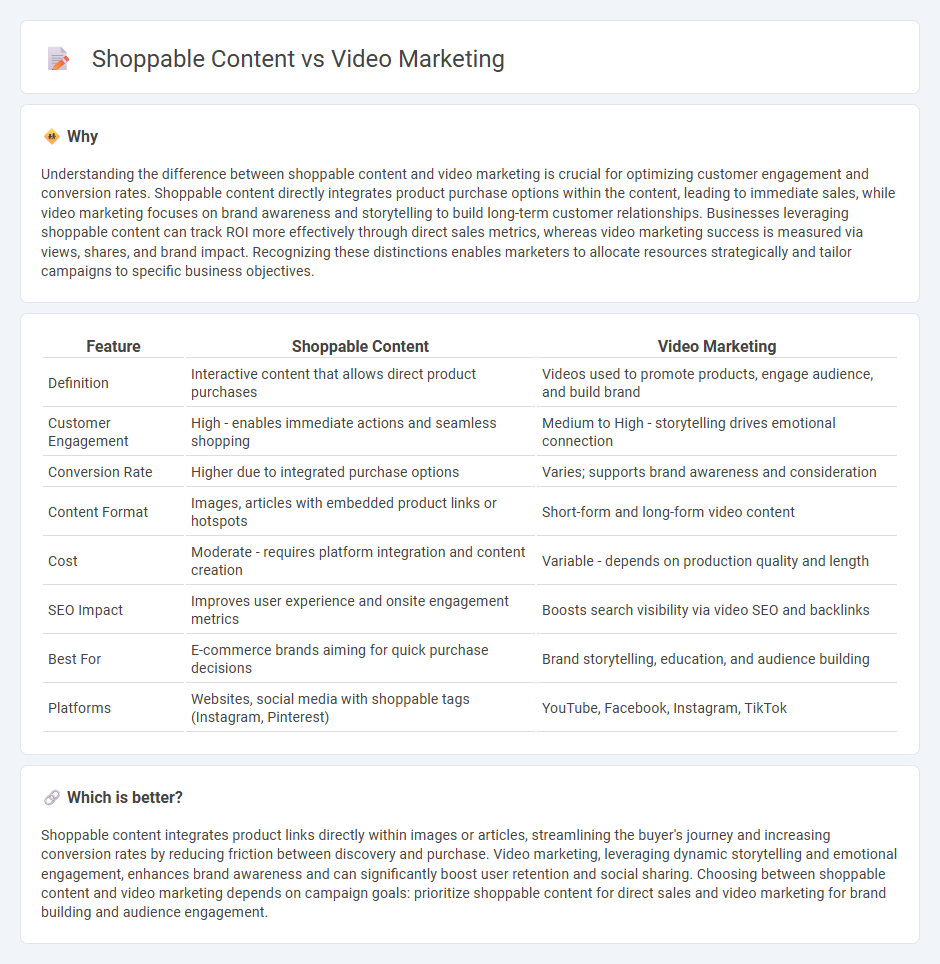
Shoppable content integrates direct purchasing options within visual media, enabling consumers to buy products instantly from images or articles, enhancing conversion rates and user engagement. Video marketing leverages dynamic storytelling and multimedia elements to captivate audiences, boost brand awareness, and drive sales through compelling visual narratives. Explore the distinct advantages and strategic applications of shoppable content and video marketing to elevate your marketing efforts.
Why it is important
Understanding the difference between shoppable content and video marketing is crucial for optimizing customer engagement and conversion rates. Shoppable content directly integrates product purchase options within the content, leading to immediate sales, while video marketing focuses on brand awareness and storytelling to build long-term customer relationships. Businesses leveraging shoppable content can track ROI more effectively through direct sales metrics, whereas video marketing success is measured via views, shares, and brand impact. Recognizing these distinctions enables marketers to allocate resources strategically and tailor campaigns to specific business objectives.
Comparison Table
| Feature | Shoppable Content | Video Marketing |
|---|---|---|
| Definition | Interactive content that allows direct product purchases | Videos used to promote products, engage audience, and build brand |
| Customer Engagement | High - enables immediate actions and seamless shopping | Medium to High - storytelling drives emotional connection |
| Conversion Rate | Higher due to integrated purchase options | Varies; supports brand awareness and consideration |
| Content Format | Images, articles with embedded product links or hotspots | Short-form and long-form video content |
| Cost | Moderate - requires platform integration and content creation | Variable - depends on production quality and length |
| SEO Impact | Improves user experience and onsite engagement metrics | Boosts search visibility via video SEO and backlinks |
| Best For | E-commerce brands aiming for quick purchase decisions | Brand storytelling, education, and audience building |
| Platforms | Websites, social media with shoppable tags (Instagram, Pinterest) | YouTube, Facebook, Instagram, TikTok |
Which is better?
Shoppable content integrates product links directly within images or articles, streamlining the buyer's journey and increasing conversion rates by reducing friction between discovery and purchase. Video marketing, leveraging dynamic storytelling and emotional engagement, enhances brand awareness and can significantly boost user retention and social sharing. Choosing between shoppable content and video marketing depends on campaign goals: prioritize shoppable content for direct sales and video marketing for brand building and audience engagement.
Connection
Shoppable content integrates directly with video marketing by embedding clickable product links within videos, enhancing user engagement and simplifying the purchase process. This fusion increases conversion rates as viewers can instantly buy featured products without leaving the video platform. Brands leveraging shoppable video content experience higher customer retention and improved return on investment (ROI) through seamless, interactive shopping experiences.
Key Terms
Video Marketing:
Video marketing drives higher engagement by combining visual storytelling with targeted messaging, boosting brand awareness and conversion rates across platforms like YouTube and Instagram. Shoppable content integrates e-commerce features directly into videos, but video marketing emphasizes building emotional connections and demonstrating product value dynamically. Explore how strategic video marketing can transform your brand presence and customer interaction.
Engagement
Video marketing drives high user engagement through dynamic storytelling and visual appeal, capturing audience attention and encouraging interaction. Shoppable content enhances engagement by seamlessly integrating product discovery and purchase options directly within the content, reducing friction in the buyer journey. Explore how combining these strategies can maximize your brand's engagement and conversion rates.
Storytelling
Video marketing leverages dynamic visuals and narrative techniques to engage audiences by conveying emotional and memorable stories, driving brand connection and customer loyalty. Shoppable content integrates interactive elements directly into videos, enabling seamless product discovery and purchase within the storytelling experience, enhancing conversion rates. Explore the synergy between video marketing and shoppable content to optimize storytelling effectiveness and boost sales performance.
Source and External Links
What Is Video Marketing? - Video marketing is using video to promote your product, increase engagement, and reach an audience more amenable to video than to text, creating a stronger emotional connection between brands and customers in a digital world.
Harnessing the Power of Video Content in Marketing - Video marketing involves creating and using video content to promote brands or products, prized for its ability to capture attention, increase visibility, and forge deeper connections with audiences across demographics.
What is video marketing? - Video marketing uses video content to promote a brand, product, or service and can be combined with social media or content marketing strategies to emotionally engage customers in a crowded digital environment, benefiting from advancements in smartphone and video production technology.
 dowidth.com
dowidth.com